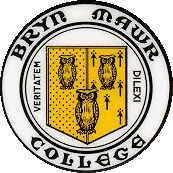

B R Y N M A W R
WOMEN, EDUCATION, and SCIENCE STUDY
Cosponsored by the College, the Alumnae Association, and the Center for Science in Society

 
| B R Y N M A W RWOMEN, EDUCATION, and SCIENCE STUDYCosponsored by the College, the Alumnae Association, and the Center for Science in Society | 
|
Despite a number of ongoing initiatives, girls and women in general still display less engagement with science than their male counterparts. A gap between what C.P. Snow (1959) termed "the two cultures" - a perception of science as distinct from other spheres of human activity - has been identified by some as contributing to a general lack of engagement with science, and may be particularly significant for girls and women. Whatever the complex of causes, there clearly remains a need for continuing and novel curricular/educational reforms that result in increased engagement of women with science, whether or not they choose to pursue careers in this area.
| The College must continue to excel in the sciences. We must ensure that all
Bryn Mawr students become literate in the concepts, processes, and goals
of science, in order that they may be informed and active participants in a
world increasingly affected by advances in scientific knowledge. We must
engage all students, regardless of their choice of major, in considering the
position of science within the context of changes in society. To these ends,
we must encourage innovative teaching in the sciences and in
interdisciplinary areas.
President Nancy Vickers |
From an inquiry into the history of science and mathematics education at the College, as well as into current explorations in this area, the researchers behind the BRYN MAWR WOMEN, EDUCATION, AND SCIENCE STUDY hope to develop a better understanding how what most effectively engages girls and women with science, one that can be effectively transferred to other educational settings.
Bryn Mawr College has established a long record of success in engaging women with science and mathematics, as measured by the percentage of women undergraduates who select majors in these areas, as well as the percentage of graduates who go on to earn doctoral degrees in them. In recent years, the College has, in addition, initiated a number of new programs aimed at more fully engaging women with science as an essential component of their overall education irrespective of their future career choices. Many of these involve efforts to bridge the "two cultures" gap. We have not, however, made any attempt to try and specify what particular spects of our programs have contributed to our record of success in involving women in scientific careers nor assessed the impact of past and current programs on women who go on to other careers.
The current project is aimed at trying to understand what aspects of our previous and current programs contribute to enhancing engagement of women with science, both professionally and generally, and how these might be generalized to work in other educational contexts. It is being led by a group of faculty from both science and non-science departments, and involves, as its first step, collecting of information from a discrete group of alumane in coordination with a study of the relationship between family and work obligations . Both studies are being organized in conjunction with Bryn Mawr's Center for Science in Society as part of its Women in Culture project.
Periodic reports on this project as it procedes will appear here. You are also invited to contribute to the project by leaving your thoughts and ideas in an ON-LINE FORUM and/or by sending email to Anjali Thapar, Kim Cassidy, Anne Dalke, Jody Cohen, Margaret Hollyday, or Paul Grobstein.
Relevant reading material and on-line resources
Home
| Calendar | About
| Getting Involved
| Groups | Initiatives | Bryn Mawr Home | Serendip Home
Director: Liz McCormack -
emccorma@brynmawr.edu
| Faculty Steering Committee
| Secretary: Lisa Kolonay
© 1994-
, by Center for Science in Society, Bryn Mawr College and Serendip
Last Modified:
Wednesday, 02-May-2018 11:47:16 CDT